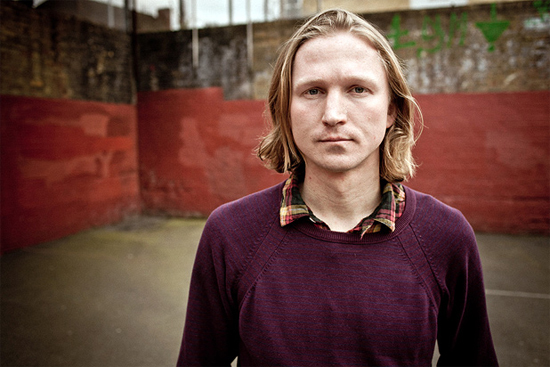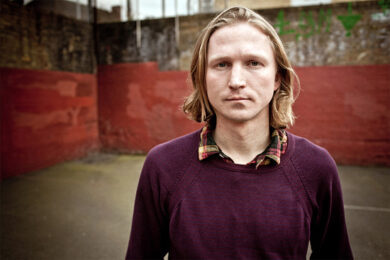Escape is the theme of Joe Dunthorne’s second novel, Wild Abandon, as its title rather elegantly suggests. Kate and Albert, sister and brother, live on a commune in South Wales set up by their parents in the early 90s. Kate, in her final year at a sixth form college she has wrangled being allowed to attend, is making preparations for her departure to university. Albert, at eleven, is stranded. Educated at home, his only playmate is Isaac, a child five years his junior, whose mother has filled both boys’ heads with ideas that the end of the world is approaching. Trapped by the loneliness of his life on the commune, Albert holds on to the thought of the forthcoming apocalypse as a source of excitement and fuel for his imagination and, ultimately, his own means of escape.
Unbeknownst to Kate and Albert, their parents’ marriage is falling apart and, with it, the foundations of the community are crumbling. Their mother, Freja, is planning on leaving and taking Albert with her so that he can go to a normal school. Patrick, the commune’s chief financial backer, has quit smoking weed and has realised he no longer wants to live in the shadow of his unrequited love for Janet, one of the other remaining founder members. Varghese, an ex-ad-man taking his honeymoon on the commune, appears to be making a documentary of the community’s demise, under the pretence of helping them rebrand and attract new members.
Wild Abandon, is, like its predecessor, Submarine, extremely funny and well observed. The writing abounds with perfect nuggets of detail, such as the biscuity smell emitted by the heating vents in the communal Volvo, or the excitement of going to the toilet when you’ve just taken your first pill. The laughs are bluntly well-played, Dunthorne’s characters resembling Kurt Vonnegut’s in their comic book traits – and they are no less perceptively drawn. Don, Kate and Albert’s father and the head of the community, in particular strikes a chord as a middle-aged man too caught up in himself to notice what’s going on around him. His response to the possibility of his wife leaving him is to shave off his long-established beard, an action which both perfectly encapsulates his flaws and rings true to life.
Dunthorne navigates his way through the multiple characters’ storylines with skill and an excellent sense of pace. However, their very multiplicity means that the characters do at times feel slightly paper-thin, with not enough continuous time being spent in each person’s point of view for their actions to become particularly meaningful to the reader. The potted history Dunthorne gives of the original establishment of the commune fails properly to stand up – it seems little more than a whim which has gone on for twenty years – and it is difficult to understand why Freja ever married Don, for he appears to have been as ridiculous in his youth as he is in middle age. But perhaps this is the author’s point: that decisions made lightly can end up shaping the courses of people’s lives.
The setting of a commune makes for an entertaining metaphor for the inescapability of modern, capitalist society, although it remains a fairly superficial one. We see Patrick trying to educate Albert and Isaac against the dangers of advertising, only for the two boys to fall hook, line and sinker for the brands in the commercials he shows them. The incident is very funny but ultimately feels slightly lightweight as a piece of commentary on the world. Where Dunthorne excels is in the drawing of familial relationships and the difficulties of communication which arise between people who have lived for years in each other’s company.
A Q&A with author Joe Dunthorne
What made you decide to write about life on a commune?
Joe Dunthorne: It’s a lifestyle I’ve always had an interest in, but the real spark for the story was a friend of mine who grew up in a commune in West Wales. There was something unique about her perspective – all the romantic ideas I had about sustainable living, all the things I thought of as rebellious and cool – to her, were utterly mundane and boring.
The character of Don is somewhat reminiscent of Mr Ramsay in Woolf’s To the Lighthouse – a fairly pompous father living out a self-involved, delusional existence. Are you wary of the ridiculousness of male middle-age?
JD: Yes, it’s a difficult one. For me, the middle-aged men who do it best wear their ridiculousness as a badge of pride. I just read Disgrace by Coetzee and the man in that experiences the most profound humbling, after starting the novel with a young man’s arrogance but in the body of a fifty-year-old.
Your first novel, Submarine, was widely compared to The Catcher in the Rye for its fantastic voicing of a teenager at odds with the world. Was it a challenge to leave behind the linguistic freedom of first person narration for Wild Abandon?
JD: Absolutely. It felt like there were no rules when I was writing Submarine – I could just follow the voice, and explore whatever felt appropriate to his character. Wild Abandon has been a much bigger challenge, technically. Using a third person narrator meant that I had less to hide behind. There’s also something about the third person that, initially, made me clam up, stylistically, and turned my prose Victorian. It took me a while to loosen up, while still controlling the narrative. It’s been a fantastic learning experience, writing this book.
You are also a Faber-published poet. Nick Laird has said that he does not find it possible to write novels and poetry at the same time. How do the two disciplines sit together in your writing practice?
JD: I think that’s about right. I hardly wrote any poems while working on Wild Abandon and, now that it’s finished, I’m relieved to find the poetry is flooding back in to fill the gap. I took lots of notes for poems while writing the novel, so now it’s just a case of scavenging through old notebooks and developing the ideas that I didn’t make use of at the time.
Submarine has recently been released as a film. How was the experience of watching your novel on the screen?
JD: It was terrifying. I didn’t expect to be so nervous but, the first time I watched it, I could barely think. I just gripped the armrests and waited for it to be over. It’s got easier since then. I’ve seen it maybe six times now and I’m really proud of it. It’s strange because every scene has, for me, so many layers and subtexts: the memory of seeing a particular scene being shot on set, the memory of working on that scene in the script, the memory of writing that scene in the novel, the real life memory from which that scene was inspired… etc. It can be deafening.



